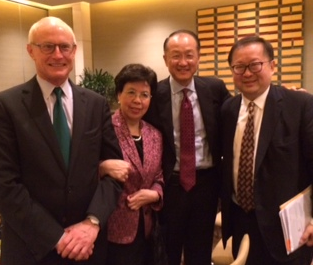Donald Li talks on China's health reform
Dr Donald Li, WONCA Executive member-at-large, was invited by World Health Organization and World Bank to participate in a meeting to discuss about China's Healthcare reform. He was amongst two speakers who were invited to present and was asked to speak on strengthening primary care in China sharing his experience in promoting family medicine over the last 20 years. The meeting was attended by vice Ministers of Finance and Health of China and the President of World Bank, Jim Yong Kim, his Vice Presidents and directors , Vice President of the International finance Corporation as well as Director General of World Health Organization Dr Margaret Chan, the Regional Director of Western Pacific Shin Young- soo, country representatives and assistants.
Photo: Donald Li (right) with (l to r) Michael Porter, Harvard Business School: Margaret Chan, WHO; Jim Yong Kim, World Bank president

Dr Li commented on challenges faced in strengthening primary care in China which included:
1.manpower issues, capacity building, training to meet the needs of the population,
2. The need to train family doctors in leadership and administration to enable them to be true managers of a multidisciplinary primary healthcare team,
3. the need for other specialists to understand the concept of family medicine through training,
4. the need to recognize that family doctors are specialists equal to hospital based specialists, and the financial incentives and reward for family doctors , and how to attract students and graduates to go into family medicine,
5.the need for primary care research to generate evidence that supports the cost effectiveness and improved health come through the practice of family medicine and
6. the need for proper community perception, appreciation of family medical practice and increased health literacy.
7. resource allocation to support the education and training of family doctors and
8. to continue to upgrade the rural practitioners which accounted for a big percentage of the primary healthcare workforce.
9. Setting up of well resourced community centers which were linked with Grade A hospitals for branding as well as providing confidence to the patients. Appropriate I.T. Support such as establishing electronic health records should be a priority.
Dr Li made recommendations to enhance the training program of family doctors to include community orientated primary care, leadership and suggested setting up structured quality assurance programs, as well as regulatory bodies such as a medical council to improve accountability and responsibilities.
He also made recommendations to enhance health literacy of the public and alter their health seeking behavior , influence their value and expectations. He urged government to support patient empowerment and mutual support groups.
His recommendation to the administration was to have policies that supported primary care in particular reimbursement policies that promote the gate keeping role of family doctors. Innovation in medical insurance allowing co payment would also promote quality through reward. Registering patients with a family doctor to establish continuity could be achieved through medical insurance maneuvers.
Lastly Dr Li reported on the successful accreditation of the Family Doctor training program in Shanghai, introduced WONCA and encouraged other provinces in china to obtain accreditation. The successful accreditation witnessed by WHO DG was a great encouragement to GPs .